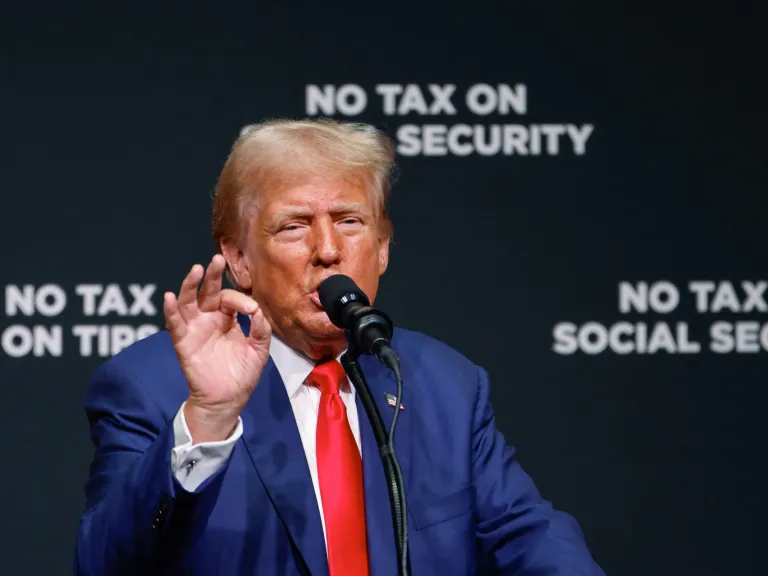A Simple Breakdown : 
Former U.S. President Donald Trump has proposed what can only be termed as a bold suggestion—zero income tax in the United States. In this alternative scenario, the American government would generate revenue rather than raising money through income tax collections. It would derive its revenues by increasing taxes on imports, or tariffs. In other words, while this concept is attractive to several Americans, it would deal a blow to various countries across the globe, especially to India and China, the latter being one of the major trading partners with the U.S. To understand this zero-tax plan that Trump has for the U.S., and by default, the other countries, we take a closer look at this concept in the article below.
What is Trump's Zero-Tax Plan?
Under the Trump plan, America will stop collecting income tax from its citizens. The government will make money on tariffs imposed on foreign products. This implies that while Americans do not pay income tax, other nations have to pay some serious surcharges for their stuff to be sold in America.
Impact on Americans
Some people may believe that many Americans should not pay any income tax. That way, they will have more money to spend or possibly even to save. There's just one catch, however: all the imported goods could be steeper, including electronics, clothes, or cars because the companies will need to cover those higher costs of tariffs. End.
Why Would Other Countries Be Affected?
The U.S. is one of the largest markets in the world. Several countries like China and India sell their goods to the U.S. Most of the revenue these countries generate can be traced back to American consumers buying their product. If the tariffs are increased, their goods entering America would be costlier and therefore fewer sales. This would reduce earnings for countries whose exports were destined for the U.S.
Impact on India
India has a surplus in trade with the U.S. in that it exports more to the U.S. than it imports. This trade will help the Indian economy a lot since the most common traded items are textile and jewelry items as well as IT services; if the tariffs increase in the U.S., India's exports to the U.S. will be costlier for the U.S. buyers, which will result in fewer sales, and consequently, India's economy will suffer from it since it will earn less money.
The implications therefore for China were immense.
China will also feel the pressure of zero-tax. It is one of the world's biggest exporters. Because of its high dependency on the U.S. market for a significant portion of its revenue, the Chinese economy will suffer if the U.S. makes Chinese products expensive due to Trump's tariffs. So, China will begin shopping around for new markets, but it is not easy to replace it with a major customer like the United States.
The Potential for Global Trade Tensions
If the U.S. raises imports of India and China, among others, this would, of course, surely build tension globally in the international trade relations. Countries may retaliate and raise their tariffs on American goods by forcing a "trade war." In such a scenario, in a trade war, countries raise their respective tariffs on each other's products, making them more expensive, thus reducing economic growth globally.
Effects on Alliances and Political Relations
Trump's policy can also impact international relations and alliances worldwide. For instance, the states in groups like BRICS-which comprise Brazil, Russia, India, China, and South Africa-would think that the U.S. is being too aggressive to their interests through the imposition of tariffs. This can help states such as India and China develop their own alliances so that they can be well-equipped to counter one another and avoid an overdramatized reliance on the U.S.
Could the plan blow up in the faces of the U.S.?
This could also backfire and harm the U.S. too. For all the revenue it might generate from tariffs, the government stands to lose out if other countries decide to stop exporting to the U.S. or simply make American goods more expensive in their markets. This would then penalize American businesses selling products overseas, and it may eventually lead to loss of jobs too if companies need to cut costs to survive.
Bottom Line
Trump's no-tax plan sounds highly attractive for Americans, but its consequence on other countries is a very severe measure. India and China will lose their marketability in US. Bad news for their economy, and thus all tensions will lead towards global trade tensions. It also comes with risks to the U.S., maybe forcing increased prices for imported goods, thus potentially inflicting damage on American-based companies selling overseas.
This plan is quite a drastic shift in how the U.S. may approach the world's economy. A bold idea with sobering implications that could reshape trade, impacting relations worldwide for decades.
Posted Using InLeo Alpha